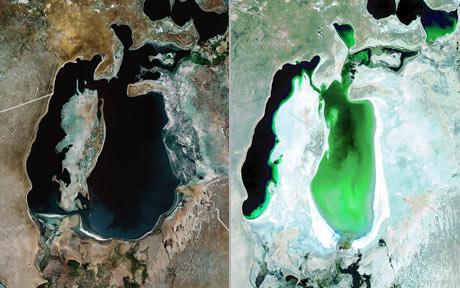It seems like every other post I was link dropping Johannes Linn's Brooking Institution pieces on Central Asian's energy, water, and food challenges, but today is the day, my friends, when I actually discuss them!
1. Central Asia's Energy Challenge – In Linn's ‘Central Asia's Energy Challenge; Overcoming the Natural Resource Curse‘ he reports back from an Almaty conference on ‘Institution Building and Economic Development in Central Asia’ and proceeds to break down what the Central Asian leaders need to accomplish and focus on in order to get the most out of their natural resources for their nation, its citizens too, not just themselves.
Important decisions CA leaders have to make:
a. whether to extract the energy resource as quickly as possible or to save it underground in case prices get even higher.
b. whether to run the energy sector as a state monopoly or to provide open access to national and international private investors
c. whether to spend or save the national earnings from the resources
d. finally, who to bestow the honor of selling the resources to?
One of Linn's most salient points is that all of these decisions provide opportunities for special interests to abuse. In other words, many people want to receive these energy resource rewards, and without a transparent government, institutions, and processes certain interests may take advantage to the detriment of society as a whole. For this has happened to a majority of states ‘cursed’ with energy riches. So how does Linn propose the leaders and government's of Turkmenistan, Uzbekistan, and Kazakhstan with their oil and gas supplies, and Kyrgyzstan and Tajikistan, with their hopefully future electricity and water supplies, institutionalize a productive, efficient, and fair way of profiting from their land? He states four rather general prescriptions that lack actual specifics, but thankfully follows them up with two solid recommendations; 1. effective use of a national resource fund 2. membership in the Extractive Industries Transparency Initiative, which aims to assist countries with managing natural resource in a transparent and accountable manner.
First his general recommendations;
1. Think long-term, don't rush
2. Effectively manage the path of extraction, ‘go where the greatest capacity is and where risks of mismanagement are least’
3. Manage the overall fiscal balance along with the non-energy fiscal balance, do not let things get out of whack in other words
4. Most important, introduce transparency and accountability in decision making and implementation
After reading these, I wondered how we are to expect autocrats such as Berdimuhammedow, Nazarbayev, and Karimov to just implement transparency in their greatest controlled asset! But Linn provides two more specific recommendations to avoid or contain the ‘curse’ and rightly acknowledges that Nazarbayev's Kazakhstan has done a more than solid job managing his nation's energy supplies. The instrument of a national resource fund can help a country save for the tougher times of lower prices and curtail wasteful spending and corruption, as Kazakhstan has shown by putting in over $21 billion into their fund and diversifying their economy, building up their infrastructure, and paying off debt. Linn's second sound proposal is for all these states to become members of the the Extractive Industries Transparency Initiative (EITI) which publishes annual reports about how well each nation under its watch manages their natural resources, in other words it keeps an eye on graft, poor use, and mismanagement. Kyrgyzstan is already a member of EITI along with Kazakhstan, but Tajikisan, Uzbekistan, and Turkmenistan are not. It is the hope that transparency begets responsible government and action that in turn provide the each of nation's citizenry with the resources they deserve.
2. Water-Food Crisis in CA – This is a companion piece to Linn's earlier work on the impending water crisis in Central Asia after last year's drought and particularly harsh winter, updating on the international response. In this piece, Linn is reporting back from another conference in Almaty, this one including international and bilateral agencies reviewing the region's water-food situation and planning a response. Linn was overall pleased with the response, even calling it 'swift’, by the UNDP, international financial institutions, and bilateral donor agencies in order to help the region's states to prepare for coming droughts and tough winters. Though we have just discussed Tajikistan's water issues, Linn provides a review of the whole region's situation and cites World Bank statistics and predictions regarding the region's past and future levels of precipitation, temperature, snow cover, river flows, reservoir levels, and vegetation. Though there were many ‘normal’ signs of in these sectors, the World Bank report and Almaty conference warned of 'serious economic and social consequences’ for a majority of regions if efforts were not made to solve the region's water and food situations. I do not have time to go over all the recommendations, but Linn seemed hopeful that the international community would help the readiness of the region's governments to respond with effective policies and interventions, instead of just squabble with each other as in the past, to minimize future hardships when, not if, they come to pass. This is great news that the leaders of CA and of the international community are getting together at a time of relative calm in order to help prepare for a moment of strain and pressure, but until those moments arise one can never really know how much progress was made.
I’ll leave you with some good news, it appears the World Bank and Kazak gov-led Aral Sea project is making some progress, as the northern part of the former great lake has seen its water grow by 30% in the last five years. We can only hope that this is just a start.
 The Aral Sea in 2004 on the right, and today on the left.
The Aral Sea in 2004 on the right, and today on the left.
(Photo Source: GoogleEarth/PA)